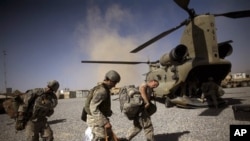The founder of the website WikiLeaks is defending his organization's decision to publish more than 75,000 internal documents on Afghanistan on its website, saying the goal was to create a complete picture of the war effort.
Speaking in London Monday, Julian Assange said no one document has great impact, but put together, the secret U.S. military reports are compelling.
"It is a history, it is an enormous compendium of material that will affect many different people in many different ways," Assange said.
The White House, Britain and Pakistan have condemned the online whistleblowing group's release Sunday of the classified documents. White House national security adviser Jim Jones said the release "put the lives of Americans and our partners at risk."
The Afghan government in Kabul expressed shock over the release, while at the same time insisting most of the information is not new.
Assange said the documents are more than seven months old, and he does not believe their release reveals troop movements or other sensitive tactical information.
"We have no reason to doubt the reliability of these documents. We should say what they do not include, they do not include top secret reports, they do not include most reports from U.S. special forces, they do not include reports by the CIA, they do not include reports by other coalition partners," Assange said. "However, they do include the majority of regular U.S. Army activity."
Assange added the reports give a wide picture of the war in Afghanistan and how it is progressing, and give a more accurate picture of civilian deaths.
"Most of the deaths in this war are as a result of the everyday squalor of war, not the big incidences. That said of course, there are reports with high kill counts in this material," he said.
Assange also alleged military units misrepresent the killings of civilians, citing an implausibly large number of deaths from ricochets, and said the military is improperly classifying civilians as insurgents.
"The cover-ups of those sorts of crimes begins at the bottom and moves its way to the top, so it is quite hard to enact a new policy and have it filter down to a change in practice," Assange said. "A new policy by Obama does not mean a change of practice by the U.S. military any more than a new policy by McChrystal meant a change in practice by U.S. forces."
A court must decide whether crimes have been committed, said Assange.
"There does appear to be evidence of war crimes in this material. An example is the Task Force 373 high-miles missile strike on a house, which killed seven children." And he said the documents offer a strong case for an investigation.
"This material does not just reveal abuses, this material describes the past six years of war, every major attack that resulted in someone being detained or someone being killed," said Assange.
He added the comprehensiveness and searchable database that Wikileaks has put the documents into are intended to encourage others to investigate further.
"We would like to see this material, the revelations that this material gives, be taken seriously, investigated by governments, and new policies out in place as a result, if not prosecutions of those people who have committed abuses," he said.
But he cautioned that not every source in every document should be given equal weight.
"Just like dealing with any source, you should exercise some common sense," said Assange. "That does not mean you should close your eyes."
Assange said Wikileaks has 15,000 more reports relating it is still reviewing and may release at a later date.
Related video report by Mil Arcega:














